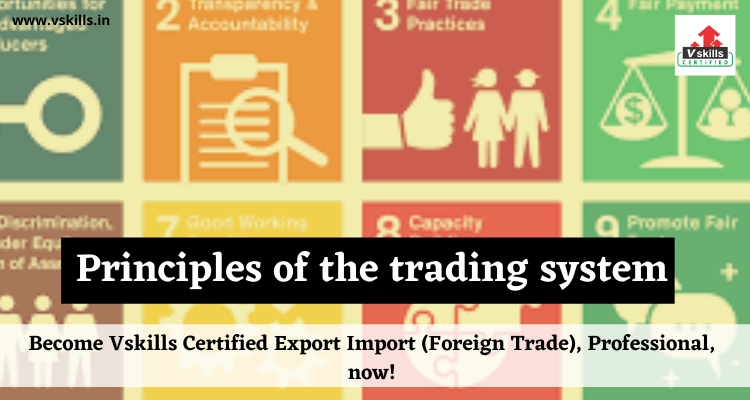Principles of the trading system
There are basically five principles of Trading System:
- Nondiscrimination: Nondiscrimination has two major components: the most-favored-nation (MFN) rule, and the national treatment principle. Both are embedded in the main WTO rules on goods, services, and intellectual property, but their precise scope and nature differ across these three areas. This is especially true of the national treatment principle, which is a specific, not a general commitment when it comes to services. The MFN rule requires that a product made in one member country be treated no less favorably than a “like” (very similar) good that originates in any other country. Thus, if the best treatment granted a trading partner supplying a specific product is a 5 percent tariff, this rate must be applied immediately and unconditionally to imports of this good originating in all WTO members. In view of the small number of contracting parties to the GATT (only 23 countries), the benchmark for MFN is the best treatment offered to any country, including countries that are not members of the GATT
- Reciprocity: Reciprocity is a fundamental element of the negotiating process. It reflects both a desire to limit the scope for free-riding that may arise because of the MFN rule and a desire to obtain “payment” for trade liberalization in the form of better access to foreign markets. The costs of liberalization generally are concentrated in specific industries, which often will be well organized and opposed to reductions in protection. Benefits, although in the aggregate usually greater than costs, accrue to a much larger set of agents, who thus do not have a great individual incentive to organize themselves politically. In such a setting, being able to point to reciprocal, sector-specific export gains may help to sell the liberalization politically. Obtaining a reduction in foreign import barriers as a quid pro quo for a reduction in domestic trade restrictions gives specific export-oriented domestic interests that will gain from liberalization an incentive to support it in domestic political markets. A related point is that for a nation to negotiate, it is necessary that the gain from doing so be greater than the gain available from unilateral liberalization. Reciprocal concessions ensure that such gains will materialize
- Binding and Enforceable Commitments: Liberalization commitments and agreements to abide by certain rules of the game have little value if they cannot be enforced. The nondiscrimination principle, embodied in Articles I (on MFN) and III (on national treatment) of the GATT, is important in ensuring that market access commitments are implemented and maintained. Other GATT articles play a supporting role, including Article II (on schedules of concessions). The tariff commitments made by WTO members in a multilateral trade negotiation and on accession are enumerated in schedules (lists) of concessions. These schedules establish “ceiling bindings”: the member concerned cannot raise tariffs above bound levels without negotiating compensation with the principal suppliers of the products concerned. The MFN rule then ensures that such compensation—usually, reductions in other tariffs—extends to all WTO members, raising the cost of reneging
- Transparency: Enforcement of commitments requires access to information on the trade regimes that are maintained by members. The agreements administered by the WTO therefore incorporate mechanisms designed to facilitate communication between WTO members on issues. Numerous specialized committees, working parties, working groups, and councils meet regularly in Geneva. These interactions allow for the exchange of information and views and permit potential conflicts to be defused efficiently. Transparency is a basic pillar of the WTO, and it is a legal obligation, embedded in Article X of the GATT and Article III of the GATS. WTO members are required to publish their trade regulations, to establish and maintain institutions allowing for the review of administrative decisions affecting trade, to respond to requests for information by other members, and to notify changes in trade policies to the WTO. These internal transparency requirements are supplemented by multilateral surveillance of trade policies by WTO members, facilitated by periodic country-specific reports (trade policy reviews) that are prepared by the secretariat and discussed by the WTO General Council.
- Safety Valves: A final principle embodied in the WTO is that, in specific circumstances, governments should be able to restrict trade. There are three types of provisions in this connection: (a) articles allowing for the use of trade measures to attain non-economic objectives; (b) articles aimed at ensuring “fair competition”; and (c) provisions permitting intervention in trade for economic reasons.



